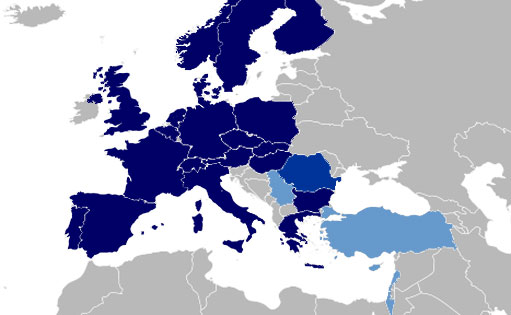
ATLAS e-News
23 February 2011
Four states apply for full CERN membership
2 June 2009

CERN states in dark blue, Romania in medium blue, and applicant states (Serbia, Turkey, Cyprus, and Israel) in light blue. Modified from free vector map.
Four new countries are applying to become full CERN members. Israel, Turkey, Serbia – which all have collaborating institutes within ATLAS – and Cyprus have recently submitted their candidatures to the CERN Council. If they were accepted, it would take the current total of 20 countries – plus one candidate now-in-accession, Romania – to 25.
The governments of the countries have each supplied a formal application letter, requesting to join. In addition, they have all submitted, or are soon expected to submit, a file detailing the economic conditions of their country, its academic activities with particular reference to particle physics, and other pertinent issues.
The next step is for dedicated task forces to look in detail at each application, in particular at the contents of the files. At the same time, existing CERN member states must, individually, consider the applications from a political point of view.
On the basis of these factors, the Council could decide whether or not to admit the applicant as a Candidate for Accession. Those who are successful would ramp up their contributions to the CERN budget over a transition period of one-to-five years, after which time a final decision about their membership would be taken by the Council.
Ordinarily, this process would begin at the next meeting on June 18th, but last year, the Council identified a need to step back and look strategically at how the organisation should develop with time. To meet these needs, a working group was set up in December to address the scientific and geographical enlargement of the organisation. This body will outline to Council, by the end of December this year, possible scenarios for these enlargements.
Since the CERN Convention stipulates that the organisation should provide for collaboration among European states, the working group will give specific consideration to how the organisation defines ‘Europe’ in these modern times. “That doesn’t necessarily mean that non-European states cannot become members,” cautions Torsten Åkesson, President of the CERN Council, “but we do have a special obligation with respect to European states.”
In June, the Council will discuss the relation between the ongoing work of the enlargement working group and the recently received applications; specifically, they will decide whether they ought to proceed with processing the applications now, or wait to treat the applications until the working group has finished its task.
“The uncertainty we have right now is this more general enlargement process, which is important because it will decide to quite a degree how this organisation will develop,” says Torsten Åkesson. “But of course it’s hard to imagine a process which will see the organisation becoming more restrictive in its membership,” he says, quipping: “After all, it is a working group concerned with enlargement.”
ATLAS’s Giora Mikenberg has spent over 25 years helping his home country, Israel, move closer to European science, and says it would be “a pleasure” for it to receive official recognition as a CERN member. Israel is proportionally the highest paying observer state to the CERN Council, having been involved since 1991.
Giora recognises positive and negative aspects to the potential change: On the one hand, Israel’s contributions are currently “in kind” via industry, or in the form of funding for specific programmes. “And this is a very nice thing,” he considers. “One finds where are the weak spots where one can be helpful.” But full members’ money goes into a general pot. Countries’ influence over the use of the money is proportional to their contribution to it, which in Israel’s case would be around 1.2 per cent.
“In that sense, you have more positive influence in being able to find the weak spots, than being a small portion of the general CERN budget,” says Giora.
On the other hand, all of Israel’s scientific activities are concentrated in Europe; it has been an associate member of the EU Scientific Programmes since the fourth programme (we are now in the seventh); and it has long been a member of numerous prestigious European science organisations. “It makes sense to be part of CERN, and to be part of decisions which affect High Energy Physics in general,” Giora explains.
Metin Arik of Turkey is also a senior ATLAS collaborator. He considers it a mistake that his country chose to become an observer when CERN was founded in the 1950s, rather than a full member: “It set back the development of Particle Physics, Accelerator Science and other important areas of knowledge in Turkey for many years,” he says, adding that the new generation of Turkish scientists and engineers would be immensely proud if they were to become members of “an institution which represents the forefront that science and technology has reached”.
The CERN Council next meets on June 18th, where the first step will be to decide whether to press ahead with the assessment of the new applications, or whether to wait until after the enlargement working group delivers its suggestions in December.

Ceri PerkinsATLAS e-News
|